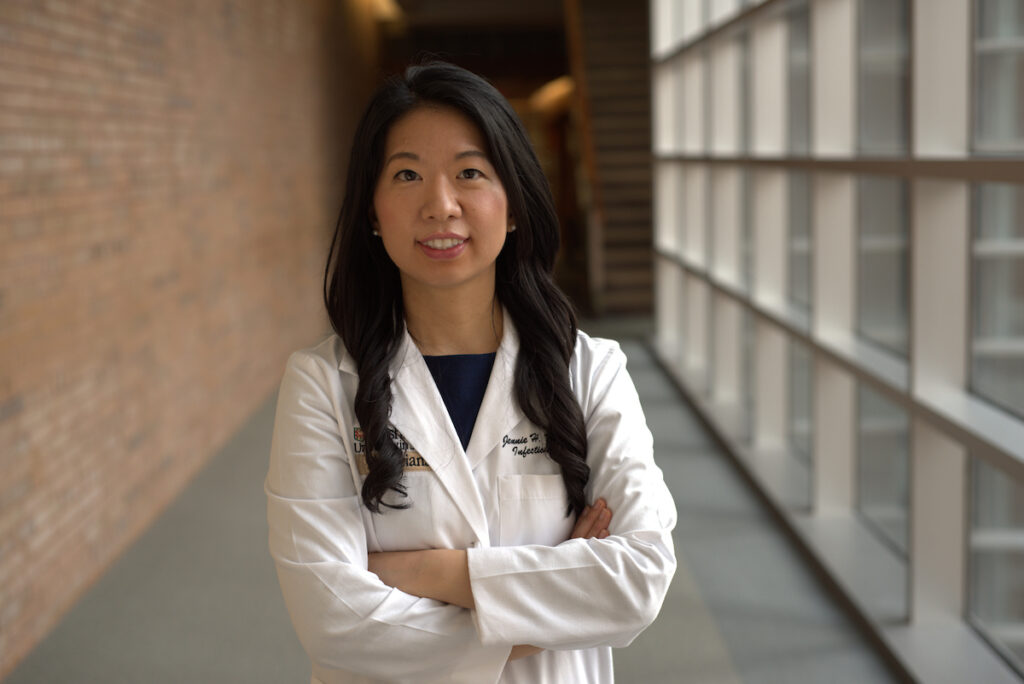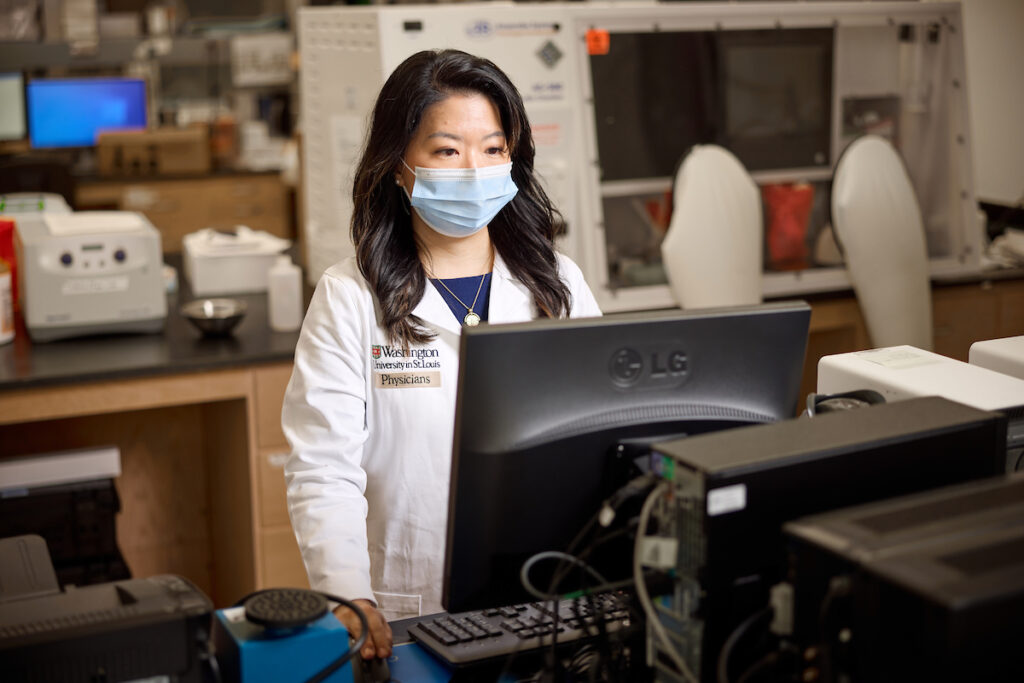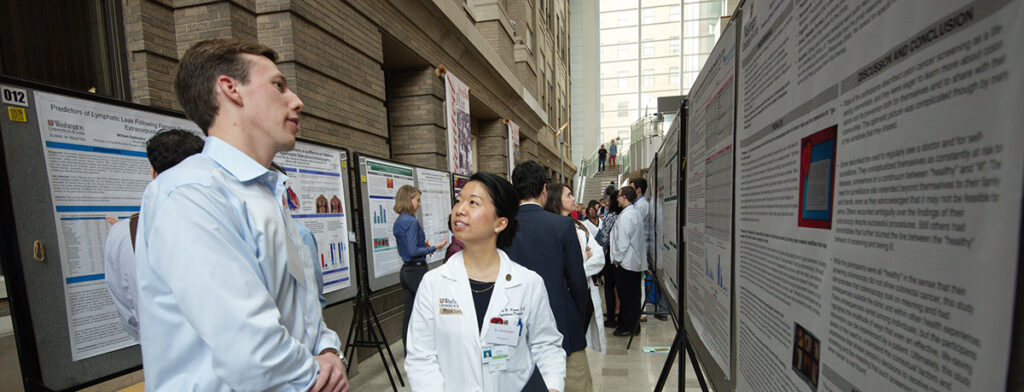As an undergraduate double major in English and Biology, Jennie Kwon, DO, MSCI, might have had a hard time predicting her eventual career path. But, during her first semester in medical school, Kwon admitted she was “bit by the proverbial microbiology bug”. “I was truly fascinated by these organisms,” recalls Kwon. “And I knew immediately that a career in infectious diseases was for me.” That initial spark grew into a strong interest in antimicrobial resistance that would later develop into her life’s calling.

Today, Kwon, assistant professor of medicine and Barnes-Jewish associate healthcare epidemiologist, specializes in clinical and translational research as an expert in healthcare epidemiology, antimicrobial resistance, and the microbiome.
Which came first, the clinician or the researcher?
Early in her career, Kwon’s initial career goal was to become a master clinician. She recalls when on rounds she always had questions like, ‘Why can’t we do this?’ or ‘Why do we do this?’ Finding that answers to her questions didn’t always exist, Kwon began to consider how research could facilitate her clinical experience at the bedside.
A pivotal moment during a transplant surgery rotation opened her eyes to the symbiotic relationship between research and clinical care. “We had a liver transplant patient who developed a severe multi-drug resistant infection after a successful surgery. Unfortunately, there was no antibiotic available to treat her, and she was eventually overcome with sepsis. This person had gone through so much to live, it was incredibly frustrating to see an infection take their life.” It became clear to Kwon then that treatments are not enough. “Resistance will happen to any drug or therapy,” said Kwon. “We need to prevent people from getting the infection in the first place.”
Fast forward and Kwon now operates her own wet lab with a clinical and research team that’s all integrated. “We take clinical and translational research ideas from the bedside of the patient, take it to the lab and then take it back to the patient with a focus on translating our work to promote infection prevention. Specifically, our lab concentrates on reservoirs of antibiotic-resistant organisms and figuring out how to prevent transmission either from an individual or through the environment.”

A research study, led by Kwon in partnership with Gautam Dantas, PhD and Carey-Ann Burnham, PhD and recently published in Cell Reports, is an example of how this relationship between clinical care and research manifests itself. Supported in part by a Centers for Disease Control and Prevention (CDC) funding mechanism, the study titled “Acute and persistent effects of commonly used antibiotics on the gut microbiome and resistome in healthy adults”, looked to examine how antibiotics affect the healthy human microbiome. Twenty healthy adult volunteers were recruited and administered 5-day courses of commonly-used oral antibiotics and their microbiome was subsequently compared to critically ill ICU patients. The study concluded that this short course of antibiotics can lead to microbiome disruption and an increase in resistance. “For some of these healthy individuals, their gut microbiome became similar to that of an ICU patient, and that’s alarming” Kwon commented. “We found that the gut microbiome can be a reservoir for antibiotic resistance, and short courses of antibiotics can lead to antibiotic scarring. These results show we do need to be judicious when prescribing antibiotics.”
Kwon shared these findings with the CDC and with the Barnes-Jewish Antimicrobial Stewardship program in hopes that it will help guide future efforts for promotion of appropriate antimicrobial use both locally and nationally.
COVID clinical care experience drives research
In March 2020, COVID-19 was spreading rapidly and Washington University School of Medicine was mobilizing quickly to care for patients, evaluate treatments, and escalate research on the novel virus. At that time, Kwon was appointed leader for all COVID-19 related issues for the School of Medicine for Occupational Health. Kwon worked closely with Hilary Babcock, MD, MPH, professor of medicine and medical director of infection prevention for BJC HealthCare, to ensure alignment of all COVID-19 related School of Medicine and BJC Occupational Health policies.
“This was an opportunity to focus on healthcare personnel,” recalls Kwon. “I considered it a great honor.”
Kwon and Babcock got to work immediately and together they developed a system to help health care workers get access to testing. They both were interested in contributing to the scientific knowledge base around COVID by utilizing the operational experience gained in their new roles. Always the researcher and clinician, Kwon published 16 papers on COVID during the last two years, including in journals such as The New England Journal of Medicine (NEJM), The Journal of the American Medical Association (JAMA), and the British Medical Journal (BMJ). The results of these studies have been utilized to support national guidelines.
One of these papers was on a multicenter study that included researchers at Washington University School of Medicine in St. Louis, the Centers for Disease Control and Prevention (CDC), and Vanderbilt University Medical Center and showed that transplant recipients who receive three doses of COVID-19 mRNA vaccine have greater protection than that provided with two doses. The study “mRNA Vaccine Effectiveness Against Coronavirus Disease 2019 Hospitalization Among Solid Organ Transplant Recipients” published online in The Journal of Infectious Diseases, showed that among transplant patients, a regimen of two doses of mRNA COVID-19 vaccine was only 29% effective at preventing hospitalization due to COVID-19, while a regimen of three doses was 77% effective.
“Our research results confirm that solid organ transplant recipients gain a significant benefit from three doses of mRNA COVID-19 vaccines,” said Kwon. “And it supports CDC recommended vaccine policies for a three-dose primary series for this vulnerable population.”
Training programs hone research skills
Throughout her career at the School of Medicine, Kwon has had the opportunity to broaden and supplement her training through a variety of clinical and translational opportunities offered through the Clinical Research Training Center. She completed the Mentored Training Program in Clinical Investigation (MTPCI) and her Masters of Science in Clinical Investigation (MSCI) during her fellowship in infectious diseases.

Kwon was then accepted as a KL2 scholar and later joined the Department of Medicine faculty in January 2016. This was a pivotal time during her career, as it provided the knowledge and skills necessary to conduct clinical research. Her focus was on patients with recurrent antibiotic-resistant urinary tract infections and trying to understand the link between the urine and gut microbiome. This multidisciplinary study, titled “Persisting uropathogenic Escherichia coli lineages show signatures of niche-specific within-host adaptation mediated by mobile genetic elements” was published in Cell Host & Microbe, and demonstrates the potential for within-host adaptation of persisting lineages of uropathogenic Eschericia coli. “I learned critical research skills from the MTPCI, MSCI, and KL2 programs,” reflects Kwon. “I had the will and interest for research but I needed the environment and didactic skills to grow. These programs did just that.”
“I learned critical research skills from the MTPCI, MSCI, and KL2 programs. I had the will and interest for research but I needed the environment and didactic skills to grow. These programs did just that.
Jennie H. Kwon, DO, MSCI
Today, Kwon is independently funded by the National Institutes of Health (NIH), Agency for Healthcare Research and Quality (AHRQ), and the CDC, and is a mentor with the Clinical Research Training Center, working with burgeoning clinician-scientists by guiding them on their own clinical and translational research journeys.
On the Horizon
Looking to the future, Kwon is focusing her energies on research in antimicrobial resistance and infection prevention.
“We’ve found that COVID-19 has made existing antimicrobial resistance problems even worse, probably to an extent that hasn’t even been measured yet,” speculates Kwon. In 2021, she penned an editorial in Science magazine with William Powderly, MD, the Larry J. Shapiro Director of the Institute for Public Health and co-director of the Division of Infectious Diseases in the Department of Medicine, titled “The Post-Antibiotic Era is Here”, that stresses the need to develop private-sector interest in bringing novel antimicrobial therapies through development.
Kwon feels that we collectively learned so much from COVID-19, including that it is possible to develop extensive public-private partnerships across research, industry, and public health that can immediately facilitate research and clinical trials at record speed. “Now it’s time to apply these lessons from COVID-19 to advancing the efforts behind antimicrobial resistance to combat a threat from it to global health in the future.”
For now, what is it that drives Kwon? This consummate clinician-researcher sums it up simply. “At the end of the day, I really just want to help people and give the evidence and tools necessary to help others help people.”
At the end of the day, I really just want to help people and give the evidence and tools necessary to help others help people.
Jennie Kwon, DO, MSCI